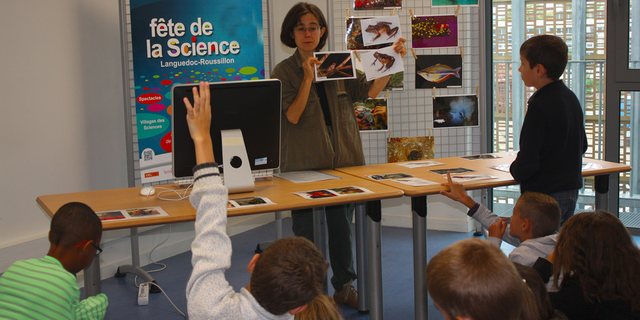One of the stated priorities in the 2016-2030 Strategic Direction Plan is to « contribute to international knowledge sharing, innovations and the ‘benefits’ that come from research, the unrestricted circulation of ideas and bringing people together ».
In 2016, the priority for action devoted to sharing knowledge with the general public was climate change and society issues with exhibitions, conferences and debates, workshops and film screenings in France, the overseas collectivities and regions, and in our partner countries in the South.

In all, more than 1,000 secondary/high school students and around 50 teachers benefited from the various initiatives run in 2016, most notably Cities in Question and Climate under Surveillance. The high-profile side event at COP22 in Marrakesh, 150 young people for a climate under surveillance, was an opportunity for students from Africa and France to call on a panel of personalities and sign up to the fight against climate change with backing from scientists.
From the conferences and debates organised to participation in public events (festivals, science fairs, environment days and so on), IRD researchers were involved in a total of 286 events in France (28%) and the overseas collectivities and regions (21%), and in partner countries in Africa (36%) and Latin America (14%). Most of these actions concerned environmental issues in Southern countries (biodiversity and climate change for 50%).
These events were an opportunity to present the 4 new exhibitions produced in 2016 on the Sustainable Development Goals, pulses, Ecuadorian biodiversity and researcher mobilisation for the climate. In all, IRD’s exhibitions, of which there are thirty or so in the catalogue, have been presented on 120 occasions in France, the overseas collectivities and regions, and more than twenty other countries.
Editorial output focused on the main research for development issues, with around 20 works published or co-published on environmental questions in the Global South, such as climate change in the Mediterranean and vector insects. The new Editions IRD online bookstore opened in late 2014 and now offers some a number of new titles. There are more than 300 publications on sale in all, a third of which are available in digital format.
2016 was marked by intense activity and the production of around 30 short and long films broadcast on TV (Arté, France 5, TV Suisse Allemande, etc.) or on the web. IRD’s audiovisual production has also been screened at around 60 national and international festivals. Three awards have been bestowed on the film co-produced by IRD, ‘Papua – an Expedition to the centre of a lost world’. With the audiovisual database put online in 2016, with a bank of 300 films and a thousand or more hours of moving images, the films produced and co-produced by IRD over the past few decades can now be accessed via the web.
Indigo, IRD’s image bank, has been expanded to include 2,500 new documents and now boasts over 60,000 photos, all captioned by researchers, making it one of the richest scientific photo libraries in France. This unique source of photographs is shared widely with more than 100,000 consultations for the Indigo image bank, presentations in several exhibitions (most notably at COP22 in Marrakech and Habitat III in Quito) and publication in the press and other works.
The Horizon bibliographic database has gained 3,000 new references and a trilingual (French, English, Spanish) search engine. It continues to be consulted frequently (7,000-10,000 files downloaded every day), especially in the Global South, ranking fifth among French open archives and third for wealth of content in the Ranking Web of Repositories de Webometrics, just after HAL to which IRD also contributes.
2016 saw the completion of the PeTroLAC project (tropical pedology open access) enabling the creation of the largest French and international bibliographic collection on tropical pedology available in a full-text, open access version online (7,500 documents).
Focus was also put on capacity-building with partners from the Global South with regard to scientific and technical information. Courses were provided on how to search and manage scientific information, with more than 300 hours of training and over 400 people trained. In 2016, the NumeriSud portal, the platform for sharing scientific resources and training tools, was opened up to the public, mainly to benefit students in the Global South.